Declines in swimming performance with age: a longitudinal study of Masters swimming champions
- PMID: 24379710
- PMCID: PMC3871048
- DOI: 10.2147/OAJSM.S37718
Declines in swimming performance with age: a longitudinal study of Masters swimming champions
Abstract
Introduction: Because of its many participants and thorough records, competitive Masters swimming offers a rich data source for determining the rate of physical decline associated with aging in physically fit individuals. The decline in performance among national champion swimmers, both men and women and in short and long swims, is linear, at about 0.6% per year up to age 70-75, after which it accelerates in quadratic fashion. These conclusions are based primarily on cross-sectional studies, and little is known about individual performance declines with aging. Herein we present performance profiles of 19 male and 26 female national and international champion Masters swimmers, ages 25 to 96 years, participating in competitions for an average of 23 years.
Methods and results: Swimmers' longitudinal data were compared with the fastest times of world record holders across ages 35-100 years by two regression methods. Neither method proved to accurately model this data set: compared with the rates of decline estimated from the world record data, which represent the best recorded times at given ages, there was bias toward shallower rates of performance decline in the longitudinal data, likely owing to a practice effect in some swimmers as they began their Masters programs. In swimmers' later years, once maximum performance had been achieved, individual profiles followed the decline represented in the world records, and a few swimmers became the world record holders. In some instances, the individual profiles indicated performance better than the world record data; these swimmers achieved their times after the world record data were collected in 2005-2006.
Conclusion: Declining physiological functional capacity occurs with advancing age, and this is reflected in the performance decrements of aging Masters swimmers. Individual swimmers show different performance trajectories with aging, declines being mitigated by practice, which improves both physiological capacity and swimming technique, particularly in the early years of participation. The longitudinal data of this study indicate that individuals can participate in high-intensity swimming over several decades, competitively improving over those decades until, in some instances, they become world record holders for their age groups.
Keywords: geriatric health; physiological functional capacity.
Figures

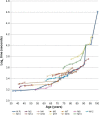
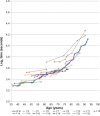
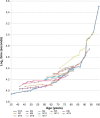
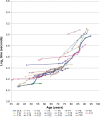
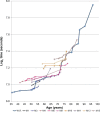
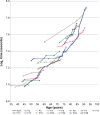
References
-
- Wiswell RA, Hawkins SA, Jaque SV, et al. Relationship between physiological loss, performance decrement, and age in master athletes. J Gerontol A Biol Sci Med Sci. 2001;56(10):M618–M626. - PubMed
-
- Arthur RJ. Swimming and cardiovascular fitness in the older age group. J Sports Med. 1975;3(1):35–39. - PubMed
-
- Zamparo P, Gatta G, di Prampero P. The determinants of performance in master swimmers: an analysis of master world records. Eur J Appl Physiol. 2012;112(10):3511–3518. - PubMed
-
- Zamparo P, Dall’Ora A, Toneatto A, Cortesi M, Gatta G. The determinants of performance in master swimmers: a cross-sectional study on the age-related changes in propelling efficiency, hydrodynamic position and energy cost of front crawl. Eur J Appl Physiol. 2012;112(12):3949–3957. - PubMed
LinkOut - more resources
Full Text Sources
Other Literature Sources

